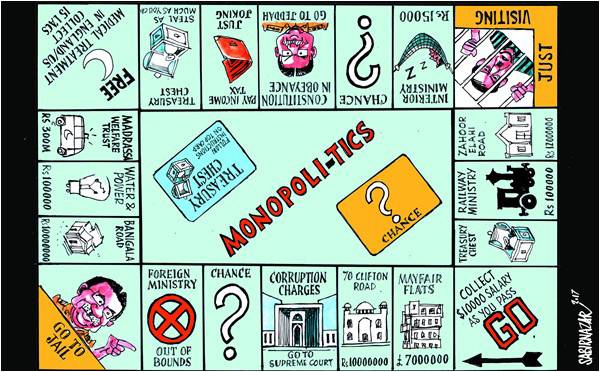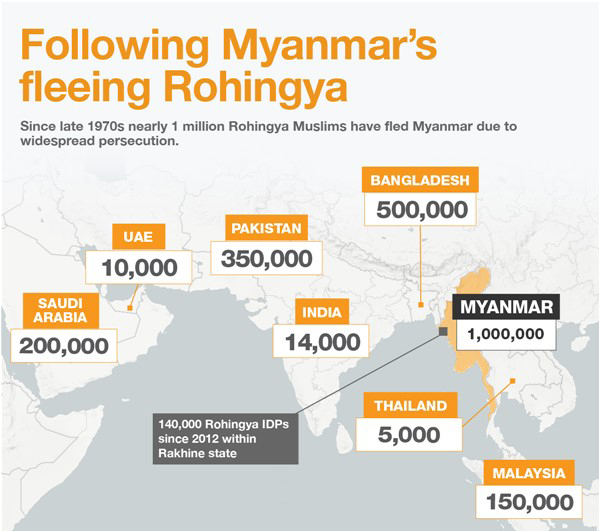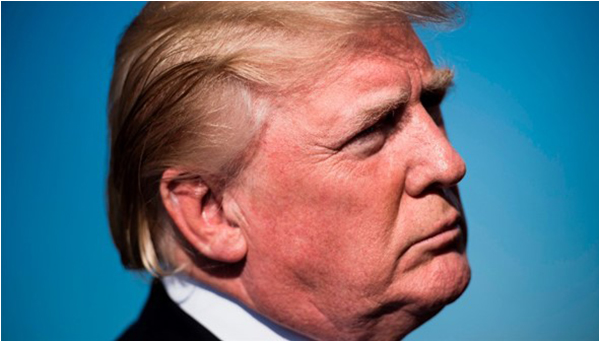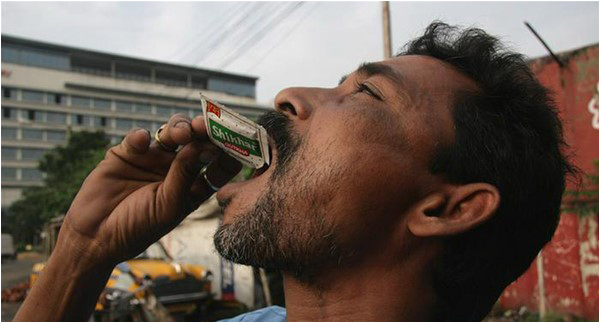

Rohingya crisis
Sir,
The Rohingyas are a minority Muslim group in Buddhist-majority Myanmar. Of the country’s total population of 51 million, only about 1.2 million are Rohingyas. But in the country’s northern Rakhine state, where most Rohingyas live in townships, they are more numerous than Buddhists.
The United Nations considers the stateless Rohingya to be among the world’s most persecuted minorities. According to United Nations estimates, about 146,000 Rohingya Muslims have fled from violence in Myanmar since August 25, 2017. The latest surge brings the total number to 233,000 Rohingya who have sought refuge in Bangladesh since October last year. The new arrivals are scattered in different locations in southeastern Bangladesh. More than 30,000 Rohingya are estimated to have sought shelter in the existing refugee camps of Kutupalong and Nayapara. Many others are living in makeshift sites and local villages.
Nearly five years later, this issue is now a full-blown humanitarian crisis and it’s time for the Association of South-East Asian nations (ASEAN) to present a regional response. Rohingyas began to flee from military oppression — first in 1978 and then again in 1991-92 — in major influxes of some 500,000 people. Presently, around 32,000 registered refugees stay in the UNHCR-run camps in Cox’s Bazar, while another estimated 500,000 unregistered refugees live outside the camps. Consequently, most of the unregistered refugees are deemed underprivileged according to the scale of basic human rights.
By the end of October 2016, the United Nations High Commissioner for Refugees had registered some 55,000 Rohingyas in Malaysia, most of whom had fled by boat. Some 33,000 Rohingyas are living in refugee camps in Kutupalong and Nayapara in Bangladesh. The Bangladeshi government has accommodated the Rohingya to a certain point, but considering limited resources as well as the poor conditions its own population lives under, it is hardly in a position to resolve the issue on its own.
The Rohingya refugee issue has been a long-standing problem and, unfortunately, the international community has remained mostly mute, unwilling to play a role in helping to resolve the problem. More than 35 years since it began, the Rohingya crisis is long overdue for a solution.
The Rohingya crisis is not just an issue for Myanmar; it will impact security and economic trends throughout the region because other countries in an otherwise stable region are becoming embroiled in the crisis; indeed, countries such as Bangladesh, Thailand, and Malaysia are increasingly feeling the spillover effects, as Rohingya seek asylum within their borders. The persecution of the Rohingya can no longer be described as merely a domestic problem for Myanmar.
ASEAN was formed in 1967 by five states: Indonesia, Malaysia, the Philippines, Singapore, and Thailand. During 1963?65, Indonesia had waged war against the formation of the Malaysian Federation, which then included Singapore. ASEAN resulted from an effort to end the war. It was Malaysia who invited Myanmar into ASEAN. Malaysia served as mediator in peace talks between the government of the Philippines and MILF, leading to the 2014 agreement, and Malaysia has tried to help establish talks between the Malay Muslim insurgents in south Thailand and the Thai government, but this was not done under any ASEAN mandate. Asean, of which Myanmar became a member in 1997, contributes to changing the political behaviour of its member states.
At this stage four of ASEAN’s ten members are directly affected by the crisis: Myanmar, Thailand, Malaysia, and Indonesia. Thailand and Malaysia carry a huge responsibility, not only for having tolerated illegal smuggling but also for making use of lowly paid immigrant labour from Myanmar and Bangladesh. As a South Asian country, Bangladesh is not a member of ASEAN but it shares responsibility for the fate of its own out-migrants as well as refugees from Myanmar when they pass through Bangladesh. In view of the recent upsurge of religious conflict in the Middle East, Africa and Europe, it is essential for ASEAN to prevent conflict between Buddhists and Muslims. In the interest of regional peace, ASEAN needs to overcome some of its inhibition against interfering with the internal affairs of its members, and develop a regional action plan to manage and resolve the crisis in the Bay of Bengal.
Refugee management in the ASEAN region is always contentious because refugees are seen as non-traditional security threats, and many countries lack effective refugee protection instruments and mechanisms. Apart from the Philippines, Timor Leste and Cambodia, no other ASEAN members have signed the Geneva Convention of Refugees and its protocols.
The ASEAN region, of which Myanmar has been a member since 1997, is interconnected by common ethnic and religious identities, culture, economic exchanges and migration. This means that any form of humanitarian crisis and extremism growing in one country is a regional security threat. Though the ASEAN Charter underscores respect for sovereignty and territorial integrity, and non-interference in the internal affairs of member states, the grouping has recently started to work on regional humanitarian issues, security promotion, conflict prevention and preventive diplomacy. Some ASEAN countries, such as Indonesia have started breaking from the principle of non-interference to comment on the Rohingya issue. Only a limited number of member states are willing to support Myanmar, and efforts are still largely fragmented, uncoordinated and led by individual countries rather than by the ASEAN community.
ASEAN may consider forming a minister-level working group with a mandate to address the refugee tragedy as a trans-national issue of long-standing concern to the whole of Southeast Asia. The working group should include ministers from the main countries involved, including Bangladesh, and representatives of the Muslim, Buddhist and Christian faiths. It will also require a change in perspective in other ASEAN members, many of which see the issue as largely a national security issue, rather than a regional problem. But member countries take a conservative approach because non-intervention is a guiding principle of the 1976 ASEAN charter. And ASEAN members remain divided on whether the Rohingya issue should be approached from a preventative diplomacy standpoint. ASEAN has been criticized for approaching the Rohingya issue too cautiously, and for failing to recognize that the ongoing conflict could divide the bloc along ethno-religious lines. The region’s population is 60 percent Muslim, 18 percent Buddhist and 17 percent Christian; continued discrimination against the Rohingya already has become a rallying cry for sympathetic Islamic extremist groups in countries that provide asylum. This is an especially grave risk for Muslim-majority countries such as Indonesia.
To avoid a worsening refugee crisis, ASEAN members must move forward with preventive diplomacy and push the Myanmar government to stop political violence in Rakhine state while emphasising local solutions such as legal and structural reforms that might finally allow the Rohingya to call Myanmar home. It is time for ASEAN to heed this call, shifting its mode of operation, so that mature democracies such as Singapore and Malaysia — which rank high in human-development indices — can become responsible global leaders, Malaysia seems to recognize this. To be conclude, otherwise this crisis may lead to possible breakup of the ASEAN.
Saadat Hassan Bilal,
PhD Fellow,
Quaid-i-Azam University,
Islamabad.

Trump’s invective
Sir,
In total contradiction to his earlier statements concerning the withdrawal of U.S. troops from Afghanistan, on August 22 President Donald Trump announced the American decision to position more troops in that war-ravaged country.
Trump’s repeated tweets on the Afghan imbroglio, before he took the reins of the United States, are completely different from the stance that he has taken on the issue recently. Shockingly, it is a complete u-turn. For many it is truly mind-boggling. “Why are we continuing to train these Afghanis who then shoot our soldiers in the back? Afghanistan is a complete waste. Time to come home!” Then: The U.S. “should leave Afghanistan immediately.” “No more wasted lives.” “If we have to go back in, we go in hard & quick. Rebuild the US first.” “Let’s get out of Afghanistan. Our troops are being killed by the Afghanis we train and we waste billions there. Nonsense! Rebuild the USA.”
These are some of the several tweets made by President Trump on the 16-year-old Afghan conflict. The recent stance of the U.S. to send more troops to Afghanistan is in total negation of Trump’s earlier stance which is vividly reflected in his tweets above. The international community and, perhaps, many in Trump’s own government, and the opinion- and decision-makers in the US are totally flabbergasted by the astounding change in this US posture with regard to the ongoing Afghan conflict.
President Trump’s Pakistan-bashing has totally exposed his government’s intent to strengthen India, Pakistan’s ever-belligerent neighbor, and lambast Pakistan which has suffered enormously both in financial terms and in terms of loss of invaluable human lives in the ‘US war against terror’.
By supporting India for economic reasons, as divulged by Trump in his last discourse on the Afghan conflict, he has, once again, proved that he is more of an ace businessman than an intelligent, able and farsighted statesman. In Trump’s perspective since India is doing business worth billions of dollars with the U.S., it deserves to be pampered more and given preference over Pakistan and others.
Yet another obvious reason why the U.S. has always markedly supported India is that it wants India to emerge as a regional power and play a crucial role for the U.S. to control China. India, perhaps, doesn’t realize the fact that the current U.S. benefaction to it is purely based on the attainment of its lucidly spelled out objectives. These objectives, once obtained, may, as has always happened, make the U.S. write off India for good and leave it in the lurch to fend for itself as a lone ranger in today’s volatile world.
The history of lost wars, a series of them, (Vietnam, Cambodia, Somalia, Iraq, Lebanon and presently Afghanistan) should be examples strong enough for the U.S. to learn a lesson. The latest decision of the US to send more troops to Afghanistan, contrary to its earlier decision of withdrawal, will, for sure, not make the US win its war in Afghanistan; at least that is what the history of such US adventures amply reflects.
The best option thus available to the US for bringing an end to the Afghan conflict will be to bring all the stakeholders of the conflict to the negotiating table and seek its amicable resolution. Pakistan strongly believes in a politically and economically stable Afghanistan. It also sincerely feels that in Afghanistan’s prosperity lies the prosperity of not only Pakistan but that of the entire region. Pakistan, as always, would, therefore, be willing to go to any length to ensure peace and stability in Afghanistan.
The U.S. has chosen to turn the table of its failure in Afghanistan on a susceptible target like Pakistan for obvious reasons. It is known to the world that the U.S. has lost its war in Afghanistan. It is a fact that the over 11,000 U.S. forces in Afghanistan have bitterly failed to establish its command in this conflict-ridden region. On the contrary, the U.S. forces have faced great casualties in its war in Afghanistan. This is what has become exasperating for the U.S., and brought serious disrepute to it.
The U.S. in particular and the world in general should appreciate that Pakistan has no love lost for the ruthless terrorists, no matter to which terrorist group(s) they belong. The criminal acts of these disgusting, inhuman and treacherous elements have taken a heavy toll not only on its innocent civilians (men, women and children) but also its gallant forces. Needles to say, the menace of terrorism has also phenomenally battered Pakistan’s economy.
To absolve itself of the atrocious charges of supporting terrorists and camouflaging their safe havens in Pakistan, levelled against it by the Trump administration, Pakistan must take credible measures to prove to the U.S. and the international community that the allegations are baseless and are being framed with malafide intent. If there are some terrorist safe havens still left on its soil, as claimed by the U.S., Pakistan must take concrete and immediate steps to completely obliterate the terrorists and annihilate their hideouts from this country.
Fazal Elahi,
Islamabad.

Gutka cancer
Sir,
I would like to draw your attention towards the spread of cancer because of the consumption of gutka and mainpuri. The Sindh government banned the manufacture and sale of these products across the province. But nothing has been done to enforce the ban, with betel nut shops openly flouting it and selling both products.
“Gutka and mainpuri cause cancer and other mouth-related diseases,” said Pakistan Medical Association’s Dr Qaiser Sajjad. He added that these items were usually prepared from low-quality ingredients, such as betel nuts and colorants, which often carried fungal impurities and cause liver cancer. “The most serious side-effect of prolonged use of gutka and mainpuri is the risk of cancer in the gums, mouth, throat, lungs, stomach, prostate and esophagus.”
Pan shopkeeper sell it freely. Police let them do this for bribes. I suggest asking people where they buy their gutka from to confidentially go after the source.
Abdullah Ahmad,
New Karachi, Karachi.

Shakir Ali
Sir,
A recent news item about the restoration of Shakir Ali sahib’s monumental works appeared in these pages. While it is laudatory that someone has taken notice and there is much talk of restoration, it must be pointed out that restoration of large works using oils on canvas, or on paper is the work of specialised people who are trained restorers and conservators. Though the very best expertise is perhaps in Europe and the US, there are a number of leading artists and art educators who could oversee such a restoration.
A conservation/restoration unit had been established a while ago at the State Bank Museum & Art Gallery in Karachi, which houses the priceless murals of Sadequain and paintings of Zahoor ul Akhlaq. The able team of this unit is led by Dr Asma Ibrahim, who is a world renowned archeologist and museum curator, who among others also supervised the conservation of the 1920s building of the State Bank in Karachi.
Despite good intentions we sometimes do not understand that conservation and restoration is a specialised discipline with its particular protocols and procedures and not everyone, even if an artist, is competent, skilled or qualified to undertake the laborious process.
If we really want to pay respects to Shakir Ali saheb’s genius and preserve his works for future generations then it has to be done on scientific lines, or else we can just forget about them, as any half-baked exercise will inevitably result in those paintings looking like cheap fakes.
Shakir saheb left his life’s labour and all that belonged to him to Pakistan and its future generations. Let’s value them in a befitting manner.
FZ Shah,
Lahore.

